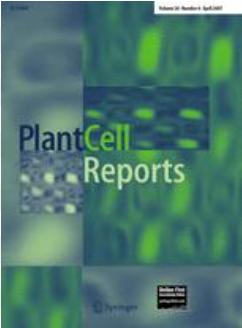抑制EPHEMERAL1的小分子通过调节花瓣衰老延长花的寿命。
IF 5.3
2区 生物学
Q1 PLANT SCIENCES
引用次数: 0
摘要
Everlastin1和Everlastin2是EPH1的有效抑制剂,通过小麦无细胞化学筛选系统被鉴定出来。这个创新的平台能够开发针对“不可药物”转录因子的小分子。通过特异性靶向EPH1通路,这些抑制剂延缓花瓣衰老,延长观赏花卉的寿命和质量。这种方法为传统的采后处理提供了一种精确的替代方法。此外,这种化学发现策略可以应用于开发其他农业重要性状和疾病相关转录因子的抑制剂,在花卉栽培,农业等领域开辟了广阔的应用前景。本文章由计算机程序翻译,如有差异,请以英文原文为准。
Small molecules inhibiting EPHEMERAL1 to extend flower longevity by regulating petal senescence.
Key message: Everlastin1 and Everlastin2, potent inhibitors of EPH1, were identified through a wheat cell-free chemical-screening system. This innovative platform enables the development of small molecules that target 'undruggable' transcription factors. By specifically targeting the EPH1 pathway, these inhibitors delay petal senescence, extending the longevity and quality of ornamental flowers. This approach offers a precise alternative to traditional postharvest treatments. Moreover, this chemical discovery strategy can be applied to develop inhibitors for other agriculturally important traits and disease-related transcription factors, opening up broad applications in floriculture, agriculture, and beyond.
求助全文
通过发布文献求助,成功后即可免费获取论文全文。
去求助
来源期刊

Plant Cell Reports
生物-植物科学
CiteScore
10.80
自引率
1.60%
发文量
135
审稿时长
3.2 months
期刊介绍:
Plant Cell Reports publishes original, peer-reviewed articles on new advances in all aspects of plant cell science, plant genetics and molecular biology. Papers selected for publication contribute significant new advances to clearly identified technological problems and/or biological questions. The articles will prove relevant beyond the narrow topic of interest to a readership with broad scientific background. The coverage includes such topics as:
- genomics and genetics
- metabolism
- cell biology
- abiotic and biotic stress
- phytopathology
- gene transfer and expression
- molecular pharming
- systems biology
- nanobiotechnology
- genome editing
- phenomics and synthetic biology
The journal also publishes opinion papers, review and focus articles on the latest developments and new advances in research and technology in plant molecular biology and biotechnology.
 求助内容:
求助内容: 应助结果提醒方式:
应助结果提醒方式:


